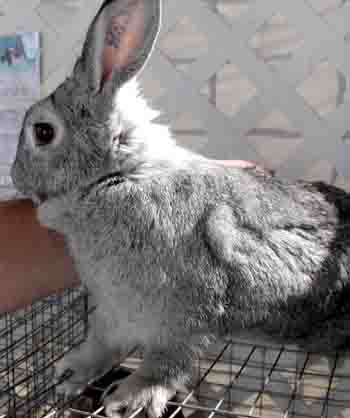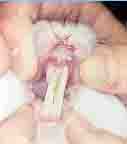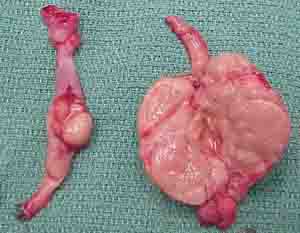Guide to Rabbit Health and Diseases
Rabbits and the field of rabbit health are becoming increasingly
popular due to the popularity of this mammal as a household pet.
Over the past several decades, rabbit husbandry and care
has evolved quite dramatically. Typical rabbit housing has gone from
outdoor wire rabbit hutches to spacious indoor habitats. Rabbit
veterinary care has evolved in much the same way. These days, rabbits
are spayed and neutered and their medical needs are met in the same way
as a dog or cat’s needs would be met. If you are a new rabbit owner,
you are probably wondering what types of diseases and conditions to
watch out for in your new pet.

Signs of Rabbit Health in this Chinchilla include a well groomed coat, clear eyes and healthy ears without flakes or wax buildup.
Source: Washington State University
Most health problems in rabbits are due to a poor diet or intestinal
problems. If a digestive system gets out of balance it could
cause problems such as stomach upset. The result is gas and a
reluctance to eat. Often this can be corrected by adding probiotics to
the diet such as Probios.
If you have a rabbit health question, we'll answer it for free by filling out the form below. If you have an urgent rabbit health question, we suggest using this online veterinary service that can answer questions 24 hours a day. You can also download this guide to rabbit health (PDF download).
Signs of a Healthy Rabbit
Whenever you purchase or check your rabbit, look for the following signs of good rabbit health.| Area
to Check on Rabbit |
Signs
of Rabbit Health |
| Mouth and Teeth |
Straight teeth that are not
broken or discolored. No drooling. Healthy pink gums |
| Skin and Coat |
Healthy looking. No flakes
or fleas. Check the skin for lumps or abscesses. |
| Ears |
Clean with no crust. No
wax buildup or flakes |
| Nails |
Trimmed nails |
| Toes |
No signs of injury |
| Legs |
Bottoms covered with fur. No
signs of infection. No limping when walking. Able to hop, sit up. |
| Personality |
Active, playful. Moves easily. |
| Urine |
Urinates in litter box or other
usual area. No blood in the urine or red spots. No urine stains
on fur where urine exits the body. |
| Feces |
Large, moist feces. |
| Body Temperature |
Normal Levels |
| Heart |
Normal heart beat. |
| Breathing |
Normal, not rapid breathing. |
| Nose |
Clean with no crust |
| Eyes |
No discharge. Rabbit eyelids are
pink under the lid. |
| Scent Glands |
Clean rabbit scent glands |
Rabbit Symptoms
Rabbit health symptoms are not always obvious and may not appear until the advanced stages of a disease. This is a survival reflex, with rabbits showing no overt indications of pain or illness. Because of this, it's important to watch your rabbit carefully for obvious signs of disease such as:
- lethargy
- appetite loss
- pain when walking (limp)
- problems urinating
- teeth grinding
- hair loss
Seek emergency rabbit health care if you see any of the following symptoms:
- if the rabbit is unresponsive
- if you believe the rabbit is in a coma
- tilted head or lean (caused by middle ear infection, parasites
that invade the brain or head injury)
- bleeding that will not stop
- heatstroke
- body temperature below 99F (37.2C)
- collapse: caused by prolonged anorexia, urinary obstruction,
trauma, heat stress, gastrointestinal problems, respiratory problems
- rabbit diarrhea that is severe
- maggots
- breathing or respiratory problems
- constipation
- behavior change
Rabbit Body Temperature
A normal rabbit rectal temperature is between 101F and 104F. You can take a rectal temperature with a digital thermometer. If the temperature is 104F or higher be sure to see a veterinarian.Rabbit Heatstroke:
One risk to rabbits is heatstroke. Rabbits doe not sweat like people, making it more difficult for an animal to control body temperature. The one exception in rabbits is the ability to sweat through the ears. They can regulate their temperature by drinking water and through heavy breathing. Symptoms also include high body temperature. To lower the rabbits temperature, apply cool water to the body. Prevention is to avoid the problem by providing a rabbit with cool water and shade in the rabbit cage
Rabbit Dental Disease
One of the most common types of diseases seen in pet rabbits is dental disease. Rabbits have continually growing teeth and require appropriate chewing materials to help keep their teeth properly worn down. The absence of appropriate chewing materials can cause the teeth to overgrow, leading to a condition called malocclusion. Rabbit teeth will naturally grow approximately 4 inches per year. Genetics are also thought to contribute to the development of malocclusion. Signs of malocclusion include sudden weight loss, difficulty chewing food, and/or visualization of the incisors when the mouth is closed. Malocclusion can occur with the incisors (the front teeth) or the molars (the cheek teeth). If your veterinarian suspects malocclusion, he or she will perform a thorough oral exam, including a speculum for visualization of the cheek teeth. Treatment of malocclusion involves extraction or trimming and filing of the teeth. If left untreated, malocclusion can lead to oral abscesses, severe malnutrition, and even death.
For more on rabbit health and teeth, listen to this AVMA podcast on rabbit dental care:

A rabbit health issue where the teeth that grew too long. Rabbits need access to grass or something to chew on in order to keep teeth at the normal length
Rabbit Skin Diseases
Skin diseases are also very common in rabbits. Often, rabbit health issues such as skin
diseases are parasitic in nature as described below:
Just as in the cat and dog, flea dermatitis is one of the most common types of skin disease. Rabbits are just as habitable to the flea as a dog or cat, and fleas can easily be transmitted between animals within a household. Mites are also fairly common in rabbits, particularly the ear mite. Fleas and mites both cause intense itching, and both are visible with the naked eye. Fleas are small, dark-colored, and flat. Mites are even smaller and white in color. Fleas are treated with a topical veterinary flea product, such as Advantage®. Remember that every pet in the house needs to be treated, even if the fleas are only visible on one pet. Mites are treated with injections of ivermectin, which can be given by your veterinarian.
Rabbit ear mites will cause a crusting in the ears. (Psoroptes
cuniculi). These are not the same mites that cause dog mite problems.
In
addition to crusting, symptoms include ear scratching and shaking.
Treatment includes ear cleaning with mineral oil. Advanced cases
require prescription medications such as the ivermectin mentioned
above. A rabbit suffering from ear mites should be kept away from other
rabbits until the treatment has been completed.
Skin abscesses are bumps which appear just under the skin in either an area that has been injured to where bacteria has taken hold. The lumps will feel solid. They do not cause the rabbit pain with touched. An abscess can also form behind the eye, causes the eyes to bulge. Rabbit skin abscesses are treated by draining the abscess and then with antibiotics. The disease is prevented by keeping the rabbit cage clean.
Rabbit Coccidia
Coccidia in rabbits is an intestinal parasite. A type of
rabbit coccidia can inhabit the liver causing an enlarged liver,
inhibiting a rabbit's growth. Diagnosis of liver disease is through a
fecal examination. Intestinal infestations are often asymptomatic
(shows no symptoms). Symptoms in young rabbits include diarrhea and
weight loss. Treatment is with a medication that kills parasites
such as trimethoprim-sulfa. The rabbit health disease Coccidia is prevented by maintaining a
hygienic hutch/cage, including the removal of feces.
Rabbit Diarrhea
Rabbit diarrhea is a symptom of some other disease or problem. Symptoms of rabbit diarrhea include soft or loose stools, and an increase in bowel movements. Causes include a high carbohydrate diet with low amounts of fiber.
Rabbit Diarrhea Age 1 to 14 Days
Diarrhea in baby rabbits is usually caused by intestinal bacteria (escherischia coli). All rabbits in a litter are usually effected.
Rabbit Diarrhea: Weaning Rabbits
Diarrhea in weaning rabbits is usually caused by bacterial enteritis.
Diarrhea in Adult Rabbits
There are several causes of rabbit diarrhea in adults:
- Enteritis: inflammation of the rabbit's small intestine. It is
#1 cause of death in weaning rabbits. Causes include improper feeding,
such as foods that cannot easily be digested by young rabbits.
Antibiotic use can also trigger the condition.
- Enterotoxebenemia: condition in rabbits where the blood
contains
a toxin produced in the intestines. Rabbits that have just been weaned
have the highest risk.
- Hairballs
- Foreign Objects or Bodies: Items the rabbit swallowed such as
carpet fibers or plastic (rabbits like to chew). Symptoms include
abdominal pain, reduced appetite, and no bowel movements. Diagnosis is
with an X-Ray and surgery if required to remove the foreign object.
- Dietary Change: sudden changes in diet can result in stomach problems
Rabbit Hair Loss
There are several causes of rabbit hair loss. These include:
- Dominant rabbits pulling out the hair of subordinates
- Pregnant rabbits pull out their own hair
- Low fiber diets
- Fur mites
- Ringworm
- Injuries or skin wounds
- Skin Infection
Cancer in Rabbits

Cancer in 5 year old Giant Rabbit due
to testicular tumors. Right rabbit testicle enlarged due to tumor
(rabbit cancer). Testicle on left is a normal size.
Source: Washington State University
A third type of disease that is commonly seen in pet rabbits is cancer. Tumors of any body system can occur in rabbits, just as in any other species. Signs of internal cancers can be vague. If you notice that your rabbit seems lethargic or if he is not eating, that could indicate cancer or a variety of other diseases and he should be seen by a veterinarian. External cancers, such as skin tumors or mammary tumors in female rabbits are often visible and palpable. Uterine cancer, which is frequently seen in un-spayed female rabbits, is often accompanied by an abnormal vaginal discharge or bleeding. Any abnormal growths or discharge in the female rabbit should be evaluated by a veterinarian. Additionally, female rabbits should always be spayed to reduce the incidence of reproductive cancers.
Have a Rabbit Health or Care Question for our Vet? We Will Answer it for Free!
Do you need some rabbit care advice? Just ask a question and our Vet will answer it as soon as possible.
If your question is medical or behavior related, please include information such as species, age, diet, habitat and anything related to the medical history of your rabbit.
Please upload a picture of your rabbit, especially if you believe it will help the Veterinarian. This is often the case when you are concerned with a rabbit skin disease or coat problem. Please know that we receive many questions and answer them on a first come, first served basis. If you need an immediate response, we suggest you use this online veterinary service that is available now to answer your questions.
Other questions answered by our Veterinarian
Click below to see questions from other visitors to this page...
How to Identify A Growth In a Rabbit's Ear Not rated yet
Reader Question: My pet rabbit whom is about 5 years old appears to have some sort of growth in his ear? Not sure what it is and I would like to know …
Enlarged Female Rabbit Genitalia Not rated yet
My adult female rabbit has been lethargic and not eating for 1-2 days, and today I noticed that her genitalia are grossly enlarged, but not bleeding. …
Helping a Rabbit Die Peacefully Not rated yet
My 10 yrs old female rabbit lost a lot of weight and it seemed to be breathing slow and heavily before it died.
She was semi unconscious most of the …
References:
The Rabbit HandbookGendron, Karen
The Collapsed Rabbit
O'Mailley, Bairbre, MBV CertVR, MRCVS
Assoc. Lecturer Exotic Species
School of Veterinary Medicine, Dublin, Ireland
Comments
Have your say about what you just read! Leave me a comment in the box below.